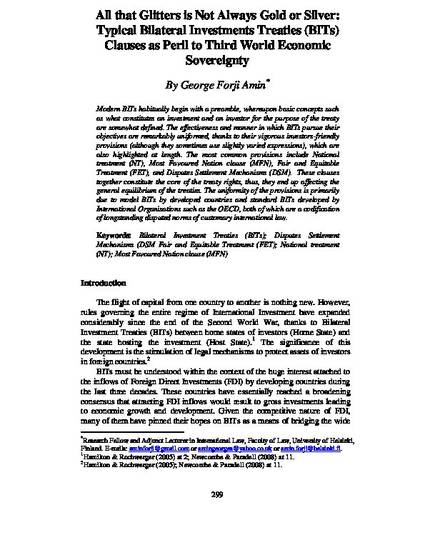
Article
All that Glitters is Not Always Gold or Silver: Typical Bilateral Investments Treaties (BITs) Clauses as Peril to Third World Economic Sovereignty
Athens Journal of Law
(2020)
Abstract
Modern BITs habitually begin with a preamble, whereupon basic concepts such as what constitutes an investment and an investor for the purpose of the treaty are somewhat defined. The effectiveness and manner in which BITs pursue their objectives are remarkably uniformed, thanks to their vigorous investors-friendly provisions (although they sometimes use slightly varied expressions), which are also highlighted at length. The most common provisions include National treatment (NT), Most Favoured Nation clause (MFN), Fair and Equitable Treatment (FET), and Disputes Settlement Mechanisms (DSM). These clauses together constitute the core of the treaty rights, thus, they end up affecting the general equilibrium of the treaties. The uniformity of the provisions is primarily due to model BITs by developed countries and standard BITs developed by International Organisations such as the OECD, both of which are a codification of longstanding disputed norms of customary international law.
Keywords
- Bilateral Investment Treaties (BITs),
- Disputes Settlement Mechanisms (DSM),
- Fair and Equitable Treatment (FET),
- National treatment (NT),
- Most Favoured Nation clause (MFN)
Disciplines
Publication Date
Summer June 11, 2020
Citation Information
George Forji Amin. "All that Glitters is Not Always Gold or Silver: Typical Bilateral Investments Treaties (BITs) Clauses as Peril to Third World Economic Sovereignty" Athens Journal of Law Vol. 6 Iss. 3 (2020) p. 299 - 322 ISSN: 2407-9685 Available at: http://works.bepress.com/amingeorgeforji/15/
Creative Commons license

This work is licensed under a Creative Commons CC_BY International License.
